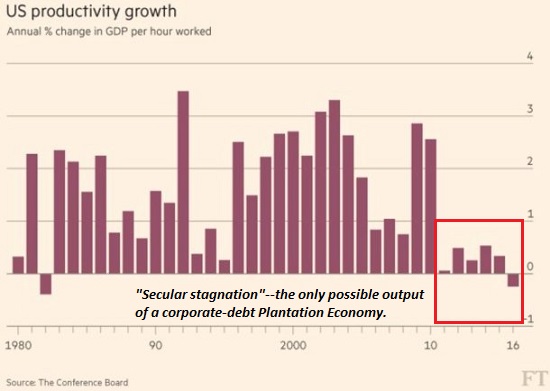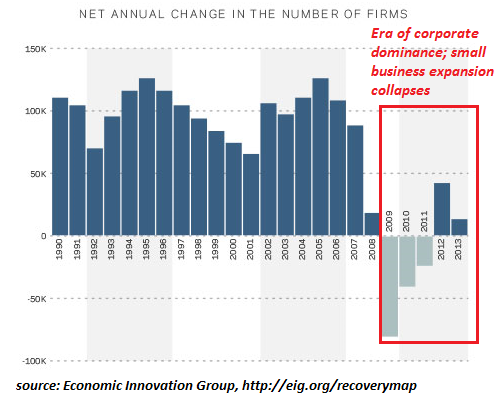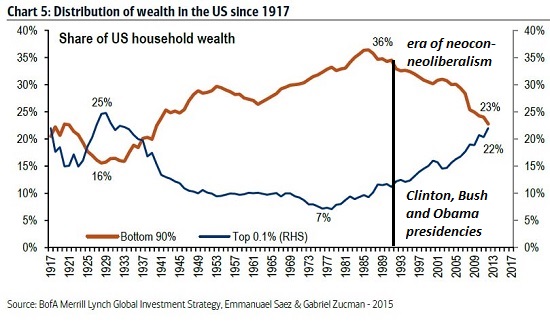We’ve been persuaded that the state-cartel Plantation Economy is “capitalist,” but it isn’t. It’s a rentier skimming machine.
I have often discussed the manner in which the U.S. economy is a Plantation Economy, meaning it has a built-in financial hierarchy with corporations at the top dominating a vast populace of debt-serfs/ wage slaves with little functional freedom to escape the system’s neofeudal bonds.
Since I spent some of my youth in a classic Plantation town (and worked on the plantation as a laborer in summer), the concept of a Plantation Economy is not an abstraction to me, but a living analogy of the way our economy works.
Wal-Mart and the Plantation Economy (August 24, 2010)
Colonizing the Plantation of the Mind (August 25, 2010)
We Need a Social Economy, Not a Hyper-Financialized Plantation Economy (November 12, 2015)
Loving Our Servitude in America’s Plantation Economy (February 10, 2017)
The Plantation Economy is extremely hierarchical. Corporations and the state are both extremely hierarchical.
In the Plantation Economy, the Company has access to nearly unlimited credit.Small businesses serving the employees and the employees have enough credit to live on but not enough to buy productive assets. As a result, the Corporation can always buy up any productive assets, expanding its monopoly.
The state also has an essentially unlimited line of credit which it can use to fund its favored cartels and state fiefdoms.
In the Plantation Economy, the Company suppresses any innovation that threatens its monopoly and the state enforces whatever means the Corporation deploys: buying up patents and small companies, predatory pricing to bankrupt competitors, etc.
The Plantation Economy is a mono-culture of large corporations and their partner in rentier skimming, the state. Our economy is a state-cartel finance-debt system; it’s only capitalist on the margins, that is, in the fringes that aren’t profitable enough for corporations to control.
The core feature of this Plantation Economy is the privileges of accumulating capital are all in the hands of the state-cartel elites. The foundation of classical capitalism is the accumulation of capital, which in our era is not just cash, factories, mines, etc.–financial and industrial capital–but knowledge capital: intellectual property, knowledge of processes, creation and control of content, research and development, control of information streams (that is, maintaining information asymmetry) and so on.
Those with unlimited access to low-cost credit can buy up or control all productive capital, including the labor of knowledge-based workers.
When an economy is optimized for global corporations, the only possible result of this arrangement is a Plantation Economy. Our economy is optimized for corporations: they have access to unlimited low-cost credit, their capital can be shifted around the globe at a moment’s notice (i.e. it is mobile), they have the tax advantages of incorporation and complex tax codes, they can declare bankruptcy without any limitations and wipe out their debts, they can engage in fraud, corruption and embezzlement and face no consequence other than a modest fine, they can suppress competition and their size enables dominance of the labor market.
Imagine if all these immense advantages were granted solely to worker-owned collectives and co-ops, and corporations were de-optimized, that is, they no longer had access to credit, their employees and managers could be jailed for systemic fraud and embezzlement, they paid high fees for merely existing and they were denied the ability to buy political influence as easily as an employee buys a loaf of bread.
The problem with a Plantation Economy is that it inevitably stagnates and collapses. Suppressing competition and innovation corrodes productivity, and as productivity and social mobility both fade, so does wealth creation.
The state-cartel Plantation eventually eats all its own seed corn via the vast expansion of credit. What appears to be “wealth” in the state-cartel Plantation is illusory asset bubbles fueled by state-engineered credit expansion.
Beneath this brittle veneer of great “wealth,” the real economy is stagnating.These charts reflect this reality:
|
Productivity: stagnant:
|
|
|
New business growth: stagnant:
|
|
|
New credit-money issued to finance, monopolies and cartels: through the roof:
|
|
|
And the only possible output of the state-cartel Plantation Economy: runaway wealth and income inequality. There is no other possible output of our system.
|
We’ve been persuaded that the state-cartel Plantation Economy is “capitalist,” but it isn’t. It’s a rentier skimming machine. Capitalism enables the accumulation of capital by anyone in a transparent market, and the capitalist state enforces a level playing field.
There’s the get-to-work horn, people. Time to labor for the rentier skimming machine and its enforcer, the state, to pay your taxes, student loans, mortgages, and all your other neofeudal “obligations” to the state-cartel elites.
My new book is The Adventures of the Consulting Philosopher: The Disappearance of Drake. For more, please visit the book's website.
Full story here
Are you the author?
Previous post
See more for
Next post
Tags: newslettersent,U.S. Federal Debt,U.S. Household Debt












































